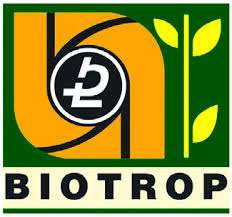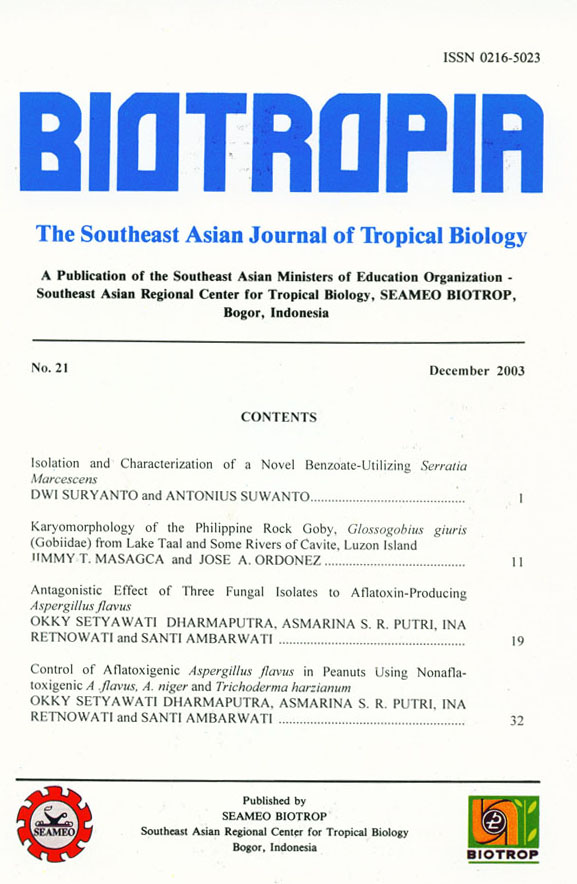
Tags
ANTAGONISTIC EFFECT OF THREE FUNGAL ISOLATES TO AFLATOXIN-PRODUCING^spergiY/HS/JavHS
Content Language : English

Aflatoxin contamination in preharvest peanuts can be controlled among others by using antagonistic fimgi
to aflatoxin-producing fungi. Aspergillus flavus is one of the fungal species where certain strains can produce
aflatoxin. Informations regarding the type of interactions between antagonistic fungi and toxigenic A. flavus, and the
effects of culture filtrates of the test fungi on the growth and aflatoxin production of toxigenic A. flavus are
necessary, before antagonistic fungi could be used as biocontrol agent. Three fungal isolates (nontoxigenic A.
flavus BIO 2127, A. niger BIO 2129 and Trichoderma harzianum BIO 19130) were tested for their antagonistic
properties against toxigenic A. flavus BIO 2132 using direct and indirect confrontation methods.
On direct confrontation method, four kinds of agar media were used, i.e PDA (Potato Dextrose Agar), MEA
1% (Malt Extract Agar 1%), SMKYA (Sucrose 200 g, MgSO47H2O 0.5 g, KNO3 3 g, yeast extract 7 g, and block agar
AA 20 g), and the mixture of MEA 1 % + SMKYA (1:1). The results indicated that the type of interactions between
toxigenic A. flavus either with nontoxigenic A. flavus or with T. harzianum was B type. In this type of interaction,
the growth of both toxigenic A. flavus and the test fungi inhibited each other (mutual inhibition) with the zone of
inhibition < 2 mm. Type of interaction between toxigenic A. flavus and A. niger depended on the kind of media. On
SMKYA and MEA 1% + SMKYA media, the interaction was B type, while on PDA and MEA 1% media it was
D type. In this D type of interaction, toxigenic A. flavus and A. niger inhibited each other (mutual inhibition) at a
distance > 2 mm.
Culture filtrates derived from nontoxigenic A. flavus and A. niger grown on ME 1%, SMKY and ME 1% +
SMKY inhibited the growth (based on dry weight) of toxigenic A. flavus, except culture filtrates derived from T.
harzianum grown on SMKY and ME 1% + SMKY media stimulated the growth of toxigenic A. flavus.
Culture filtrates of nontoxigenic A. flavus, A. niger and T. harzianum inhibited aflatoxin B\ production
of toxigenic A. flavus. Culture filtrates of A. niger and T. harzianum with conidial concentrations of IxlO6
,
2xl06
and 3xl06
per ml inhibited aflatoxin B, production up to 100%. The percentage of inhibition of aflatoxin Bi
production increased with the increase of conidial concentrations of nontoxigenic A. flavus. The highest percentage
of inhibition of aflatoxin BI production (62.5%) was obtained from conidial concentration of 3xl06
per ml.
Aspergillus niger was the most potential fungus in inhibiting the growth of toxigenic A. flavus, either on
agar media or on culture filtrates of test fungi. Culture filtrate of A. niger was also the most potential filtrate in
inhibiting aflatoxin BI production of toxigenic A. flavus.
Link

This work is licensed under a Creative Commons Attribution-NonCommercial-NoDerivatives 4.0 International License.
